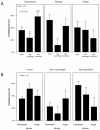Association of FMR1 genotypes with in vitro fertilization (IVF) outcomes based on ethnicity/race
- PMID: 21526209
- PMCID: PMC3078144
- DOI: 10.1371/journal.pone.0018781
Association of FMR1 genotypes with in vitro fertilization (IVF) outcomes based on ethnicity/race
Abstract
The FMR1 gene, mapping to an area of the X chromosome closely associated with autoimmunity also affects ovarian reserve, with specific genotypes associated with distinct ovarian aging patterns. They, therefore, could also be associated with differences of in vitro fertilization (IVF) outcomes, reported between races/ethnicities. We analyzed 339 consecutive IVF patients, 232 Caucasian, 59 African and 48 Asian, for FMR1 genotypes, and tested by multiple logistic regressions for associations between race/ethnicity, FMR1 genotype, autoimmunity and pregnancy chances with IVF. FMR1 genotypes were predictive of pregnancy (P = 0.046), het-norm/low most significantly and with decreasing chance in comparison to norm genotypes (OR 0.44; 95% CI 0.23-0.85; P = 0.014). Race/ethnicity was, overall, independently associated (P = 0.03), African demonstrating decreased odds in comparison to Caucasian (OR 0.33. 95%CI 0.13-0.79; P = 0.014). Autoimmunity did not differ but interaction of autoimmunity with FMR1 genotype almost reached significance (P = 0.07). Logistic regression with race/ethnicity and interaction between FMR1 genotype and autoimmunity in the model, demonstrated 2.5-times the odds of being associated with autoimmune positivity (OR 2.5, 1.34-4.55; P = 0.004). FMR1 genotypes offer a possible explanation for differences in IVF outcomes between races/ethnicities.
Conflict of interest statement
Figures

Similar articles
-
Utilizing FMR1 gene mutations as predictors of treatment success in human in vitro fertilization.PLoS One. 2014 Jul 14;9(7):e102274. doi: 10.1371/journal.pone.0102274. eCollection 2014. PLoS One. 2014. PMID: 25019151 Free PMC article.
-
FMR1 genotype with autoimmunity-associated polycystic ovary-like phenotype and decreased pregnancy chance.PLoS One. 2010 Dec 16;5(12):e15303. doi: 10.1371/journal.pone.0015303. PLoS One. 2010. PMID: 21179569 Free PMC article.
-
Differences in ovarian aging patterns between races are associated with ovarian genotypes and sub-genotypes of the FMR1 gene.Reprod Biol Endocrinol. 2012 Sep 10;10:77. doi: 10.1186/1477-7827-10-77. Reprod Biol Endocrinol. 2012. PMID: 22963248 Free PMC article.
-
Does theFMR1 gene affect IVF success?Reprod Biomed Online. 2019 Apr;38(4):560-569. doi: 10.1016/j.rbmo.2018.11.009. Epub 2018 Dec 10. Reprod Biomed Online. 2019. PMID: 30711457 Free PMC article. Review.
-
The FMR1 gene as regulator of ovarian recruitment and ovarian reserve.Obstet Gynecol Surv. 2010 Aug;65(8):523-30. doi: 10.1097/OGX.0b013e3181f8bdda. Obstet Gynecol Surv. 2010. PMID: 20955631 Review.
Cited by
-
Low normal FMR1 genotype in older adult women: Psychological well-being and motor function.Arch Gerontol Geriatr. 2022 Nov-Dec;103:104789. doi: 10.1016/j.archger.2022.104789. Epub 2022 Aug 12. Arch Gerontol Geriatr. 2022. PMID: 35981426 Free PMC article.
-
Male factor infertility: Prediction models for assisted reproductive technology.Nat Rev Urol. 2014 Sep;11(9):492-3. doi: 10.1038/nrurol.2014.181. Epub 2014 Jul 29. Nat Rev Urol. 2014. PMID: 25069731 No abstract available.
-
Utilizing FMR1 gene mutations as predictors of treatment success in human in vitro fertilization.PLoS One. 2014 Jul 14;9(7):e102274. doi: 10.1371/journal.pone.0102274. eCollection 2014. PLoS One. 2014. PMID: 25019151 Free PMC article.
-
FMR1 CGG allele length in Israeli BRCA1/BRCA2 mutation carriers and the general population display distinct distribution patterns.Genet Res (Camb). 2014 Oct 8;96:e11. doi: 10.1017/S0016672314000147. Genet Res (Camb). 2014. PMID: 25579682 Free PMC article.
-
Dehydroepiandrosterone decreases the age-related decline of the in vitro fertilization outcome in women younger than 40 years old.Reprod Biol Endocrinol. 2015 Mar 9;13:18. doi: 10.1186/s12958-015-0014-3. Reprod Biol Endocrinol. 2015. PMID: 25884390 Free PMC article. Clinical Trial.
References
-
- Grainger DA, Seifer DB, Frazier LM, Rall MJ, Tjaden BL, et al. Racial disparity in clinical outcomes from women using advanced reproductive technology (ART): analysis of 80,196 ART cycles from SART database 1999 and 2000. Fertil Steril. 2004;82(Suppl):28s.
-
- Purcell K, Schembri M, Shen S, Crougham M, Fujimoto VY. Asian ethnicity is associated with reduced pregnancy outcomes after assisted reproductive technology. Fertil Steril. 2004;82(Suppl):28s. - PubMed
-
- Purcell K, Schembri M, Frazier LM, Rall MJ, Shen S, et al. Asian ethnicity is associated with reduced pregnancy outcomes after assisted reproductive technology. Fertil Steril. 2007;87:297–302. - PubMed
-
- Seifer DB, Frazier LM, Grainger DA. Disparity in assisted reproductive technologies outcomes in black women compared with white women. Fertil Steril. 2008;90:1701–1710. - PubMed
-
- Lamb JD, Huddleston HG, Purcell K, Modan A, Farsani TT, et al. Asian ethnicity is associated with decreased pregnancy rates following intrauterine insemination. Reprod Biomed Online. 2009;19:252–256. - PubMed
Publication types
MeSH terms
Substances
LinkOut - more resources
Full Text Sources
Other Literature Sources

